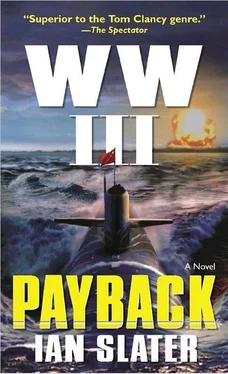The problems of planning such a mission were so myriad, they reminded Johnny Lee, the multilinguist on the team, of a set of matryoshka, Russian dolls. At first there seemed only one thing to look at, to understand, but inside each doll there was another.
Freeman sighed. “So we’re faced with a thicket of variables. Only one thing’s certain.” He turned his wrist over and glanced down at his no-glare combat watch. It was 50 hours, almost time to call Eleanor Prenty. “And that,” he continued, “is that the sooner we hit the pricks, the better chance we have of a successful mission. Any country in its right mind wouldn’t launch an attack from halfway across the world for at least a month — and not until it had the U.N. on its side.”
Aussie folded his arms tightly and smiled enigmatically at Choir and Salvini, or at least it appeared so to Gomez and Mervyn and the other three new boys, who suspected Aussie, Choir, Salvini, and perhaps the general, of having some private agenda. But far from Aussie’s grin being a shared expression of smug self-congratulation between the general and his two fellow veterans, his reaction was one of admiration for the general’s deft appraisal of the complex political and military variables involved and his signature grasp of detail. Indeed, Aussie’s smile was simply one of appreciation for the way in which General Douglas Freeman, with his Rolodex cards, had succinctly prepared them all for what Aussie could sense was about to be a “shocker.”
The latter, in this case, was the call the general was now making to the National Security Advisor in Washington, D.C. It was precisely 1400 hours, the time he had told her he would call. Heightening the attention among his audience of eight SpecFors, the general asked Eleanor Prenty if she was the only one in her office.
“I’m the only one,” she assured him, and he told her he’d brainstormed the attack and, pending her approval, was about to go from “macro” to “eyes only” superclassified “micro” details with his eight-man team.
“Eight?” One of the five new boys, Lieutenant “Bone” Brady, could hear her clearly. And then, sounding as if she thought she’d misheard the general, she said, “You mean eighty ?”
“No,” replied Freeman. “Eight, plus me.”
“But — but surely, Douglas, you need more men than that?”
“Not for an in-out quick demo.”
“Demo?” She was still tired, having gotten only three hours sleep, and for a second she misinterpreted the general’s abbreviation as “demonstration.” It was an easy mistake to make, as there’d been ongoing demonstrations outside the White House ever since the missile attacks, most signs demanding retaliation against the terrorists, others proclaiming that “Violence Begets Violence,” “Two Wrongs Don’t Make a Right.” Noticeably there were no signs accusing North Korea, the majority of the American public having assumed that the terrorist attacks on the three aircraft had been unleashed by al Qaeda and Co. sleepers.
“Demolition,” explained Freeman.
“Oh, yes, of course.”
“I’ve been on the blower and computer,” he informed her. “Transport’s all set.”
“Uh-huh,” said Eleanor, moving past her illuminated globe, closer to her office window — a Secret Service no-no — and gazing at the protesters ringing the south lawn. If they only knew what the White House knew, she mused.
One of her assistants knocked on her door. She didn’t answer, honoring Freeman’s request — demand — that she set aside this time exclusively for him. He told her he’d been working his old network nonstop since his Oval Office meeting the day before. So what did he want? wondered Eleanor. Brownie points for working hard? Working hard was de rigueur in the White House, and anywhere else in America if you wanted to survive. Besides, Freeman, his ego and pride notwithstanding, wasn’t the self-congratulatory type. There was no doubt about his self-confidence, but he wasn’t like one of those men Eleanor knew, such as her estranged husband, Tom, who expected a medal every time they performed an extracurricular task, like loading and unloading the dishwasher or putting a clothes wash in the dryer.
“I’m glad everything’s coming together,” she responded, her attention wandering back to the protestors’ signs, one of which, “NUKE ’EM!” she hadn’t seen before. What scared her was that there were people around like the onetime head of the Air Force, General Curtis Lemay, who had pressed the administration to nuke the Soviet Union and China in the crucial window of opportunity during the Korean War.
She saw another “NUKE ’EM!” sign, and realized how prudence favored a retaliatory commando in-out attack. Such a strategy would satisfy the public’s demands for action against the terrorists without giving in to the extremists who had come out of the woodwork, urging a nuclear strike against North Korea. “If I can do anything,” Eleanor told Freeman, “to help meet your six-week deadline, just tell me.”
“Thanks,” he said, “but we’re good to go. Now. We’ll be on a bus in four hours. Loaded for bear.”
Eleanor was suddenly aware that Freeman had said something about a bus, Special Forces jargon for transport aircraft.
“Ten hours for shut-eye on the way in,” the general continued. “My boys have earned it. They’ve been in-house at Bragg around the clock.” He was telling her that his team had been practicing nonstop in the “kill house” at Fort Bragg, where even the most experienced Special Forces were periodically required to hone the in-bam-out techniques required either in urban fighting or in any building from which terrorists had to be removed — alive or dead.
“Douglas—,” she began, glancing at her calendar and the hard copy of the CIA’s SITREP map of the DMZ, North Korea, and its larger-scale inset of the Kosong area. It was Tuesday, Earth Day on the calendar given to children like Jennifer all across America, each day of every month bearing the names of the deceased 9/11 victims. “—are you telling me you’re going to attack this Friday night?”
“No, ma’am,” he answered. “ Thursday night.”
“Douglas, I don’t understand. You told us it would take six weeks minimum just to prepare!”
“Well, I know the President wanted it earlier.”
“Yes, but you said six weeks. “I mean—”
“Ma’am”—he had dropped the familiar “Eleanor” in front of the team—“we had a guy from the 101st Airborne pull a pin on a grenade in Kuwait. Killed two of our officers ’fore they even had a chance to go into combat.”
She remembered the case. It had shaken America — one of their own against their own. Not a civilian traitor like the man who had gone over to train in bin Laden’s al Qaeda camps in Afghanistan, but a U.S. soldier killing his own.
“What’s your point, Douglas?”
“That guy was a Muslim,” said Freeman. “An American Muslim, a sergeant. You know how many Muslims are in our armed forces, ma’am?”
“No, but I suppose you do.”
“I do,” the general replied, “seventeen thousand eight hundred, and 99.9 percent are probably as loyal as any other American, but we need only one weak link, just one —from SOCOM down to a bus driver’s ground crew — to get wind of our intention, and we’re toast. Our best defense isn’t just offense. It’s speed. I want you to tell the President my timetable. No one else.”
“My God, General,” said Eleanor, taken aback by the force and exclusivity of the general’s request, delivered in the tone of an order. “You don’t even trust the Joint Chiefs?”
“Yes, I do,” said Freeman, “but one overheard remark at the Pentagon after our conference at the White House could’ve tipped our hand.” The line seemed to go dead. “Ma’am, you still there?”
Читать дальше












